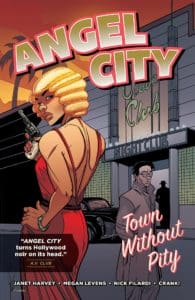When you hear “film noir,” you usually think of hardboiled detectives with fedoras on their heads and half-smoked cigarettes hanging from their lips. You think of dangerous dames and sinister conspiracies, of shady rooms and even shadier people. Angel City: Town Without Pity, a new trade paperback collection from Oni Press has all of those things with one major twist: this time, the gun moll is our heroine.
However, writer Janet Harvey spends the first few pages of the series pretending that’s not the case. We first meet Joe, a Japanese American photojournalist who goes to a grisly murder scene only to discover that the beautiful, blonde victim is his friend Frances Faye. From there, he goes to break the sad news to another aloof blonde, Dolores Dare, who convention tells us is just the girl he’ll spend the whole story saving in order to make up for losing Frances. Instead, the story switches perspective and Dolores who seeks justice for her fallen friend.
Though that sudden but deftly-handled shift is the first time Dolores subverts our expectations, it’s not the last. Dolores may be a jaded, former actress who’s dating a gangster, but she’s also his enforcer. It’s a choice that not only bucks convention, but assures the audience Dolores won’t end up as just a damsel in distress. It also speaks to Harvey’s seeming desire to fill the series with more than just strong, silent men, beating up other strong, silent men. That said, she comes by much of that diversity honestly. Some of the characters and events Harvey references (crime journalist Aggie Underwood or the animosity between the Chicano population and the local authorities, for instance) are true aspects of Hollywood history and including them gives the whole series a verisimilitude.
Still, well-written and researched as the story is, artist Megan Levens is equally responsible for making the series work. The world Harvey creates may be hardboiled, but Levens’s figures are unexpectedly supple and well-defined, emphasizing glamour over grit. That said, there’s no shortage of chiaroscuro lighting and it’s easy to picture the story unfolding in black-and-white—but then we’d have to lose Nick Filardi’s gorgeous colors. His Technicolor hues could seem strange given the story’s context, but they add to the sense of Old Hollywood glamour that gives the story its mood, making the more brutal moments of Dolores’s investigation into Frances’s murder even more effective.
Speaking of, though Frances’s murder sets the story in motion, it does get a tad lost in all the gangsters and prostitutes and Hollywood scandal. Regardless, anyone who’s seen a film noir and knows a little about Hollywood history can probably guess the outcome, but the plot isn’t necessarily the point of Angel City: Town Without Pity. It’s the mood. While the series technically reaches a conclusion, the ending also leaves the potential for more story—though not necessarily set in Hollywood. And maybe that’s for the best. Dolores is a helluva gal, but not every story needs to continue and after seeing what Harvey and Levens can do with Hollywood, imagine what they could do with Las Vegas.


